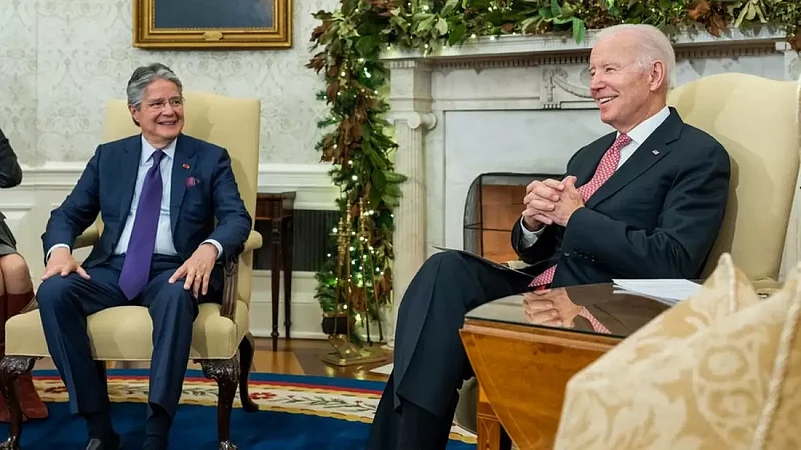With Ecuadorian President Guillermo Lasso by his side, President Joe Biden said the US is looking to expand and strengthen the US relationship with one of its staunchest allies in South America and a country that is getting plenty of attention from China.
Biden: US Looking To Strengthen Relationship With Ecuador
With Ecuadorian President Guillermo Lasso by his side, President Joe Biden said the US is looking to expand and strengthen the US relationship

Lasso's visit to Washington comes as his tiny nation is on the verge of completing a trade agreement with China, the United States' strongest economic competitor. China this year surpassed the United States as Ecuador's top trading partner on non-petroleum goods.
The already fragile economy in oil-exporting Ecuador was battered by the coronavirus outbreak. One of Lasso's top priorities when he took office last year was to sign a free trade agreement with the United States. Ecuador wants to join Colombia and Chile as the only other countries in South America to enjoy such privileged status.?
But Biden, in the first two years of his presidency, has shied away from entering new trade pacts as he's focused on first settling a U.S. economy that's been battered by the pandemic, historic inflation and supply chain issues exacerbated by Russia's war in Ukraine.
“Today we're going to keep building on the progress we've made," Biden said at the start of an Oval Office meeting with Lasso on Monday. “Together, we've made historic strides."?
Lasso was to meet with USAID administrator Samantha Power later Monday and was scheduled to hold talks with CIA Director William Burns, members of the Senate Foreign Relations Committee as well as World Bank President David Malpass and Inter-American Development Bank President Ilan Goldfajn before returning to Quito on Wednesday.
Sen. Marco Rubio, R-Fla., in a letter to the U.S. International Development Finance Corporation CEO Scott Nathan, urged the Biden administration to surge investment into Ecuador to counter China's growing influence in the region.
“While the Biden administration continues to assert that the U.S. is the partner of choice' for Ecuador and other Latin American countries, governments and civil society in the region bemoan the lack of American-led, and other Western alternatives, to the Chinese Communist Party's (CCP) current and future investments," Rubio wrote.?
The alliance has become more important to the U.S. as much of South America has veered to the left, limiting the political space for cooperation with Washington, whose military and political interventions during the Cold War is recalled with bitterness across the region.
Lasso, a conservative former banker, eked out an upset victory in last year's presidential election over former leftist strongman Rafael Correa's handpicked successor. Following his narrow win, he sought to cement a strategic alliance with Washington.
In recognition of the deepening ties, the U.S. Senate last week passed a bipartisan bill, the United State-Ecuador Partnership Act, which seeks to expand bilateral cooperation on the economy, security and environmental conservation. The effort is part of the annual defense bill that awaits Biden's signature.
Among its provisions are a promise to transfer two excess U.S. Coast Guard cutters to help Ecuador patrol the protected waters around the Galapagos Islands, where China's distant water fishing fleet has become an unwelcome presence.
“Without a doubt, yes, we have been allies for decades now,” Lasso said at the start of his meeting with Biden. “And I am here to reaffirm that theory that we share among us as allies in our fight for democracy, peace and justice — not only in the region but also to support your vision throughout the world.”
While the Biden administration says it is invested in Ecuador's success, Lasso confronts a long list of major challenges. Chief among them is the growing influence of criminal gangs — which have been behind a number of recent prison riots — and an economy pegged to the U.S. dollar that has struggled to compete with cheaper production costs in neighboring countries.?
Lasso told reporters after meeting with Biden that they spent much of their roughly hour-long conversation talking about migration and violence in Ecuador, but did not answer questions about whether trade was discussed.
A U.S. court has ordered that as of Wednesday immigration authorities can no longer quickly expel prospective asylum-seekers. Title 42, as it's called, has been used more than 2.5 million times to expel migrants since March 2020, although that number includes people who repeatedly attempted to cross the border. Ecuadorians represent only a fraction of the more than 2.7 million migrants encountered on the southwest border in the last fiscal year, but their numbers have been steadily rising since the coronavirus pandemic.
The change comes as surging numbers of people are seeking to enter the country through the southern border.
- Previous Story
 Marburg Virus Outbreak In Rwanda Leaves 11 Dead | All About The Deadly Ebola-Like Virus
Marburg Virus Outbreak In Rwanda Leaves 11 Dead | All About The Deadly Ebola-Like Virus - Next Story
























